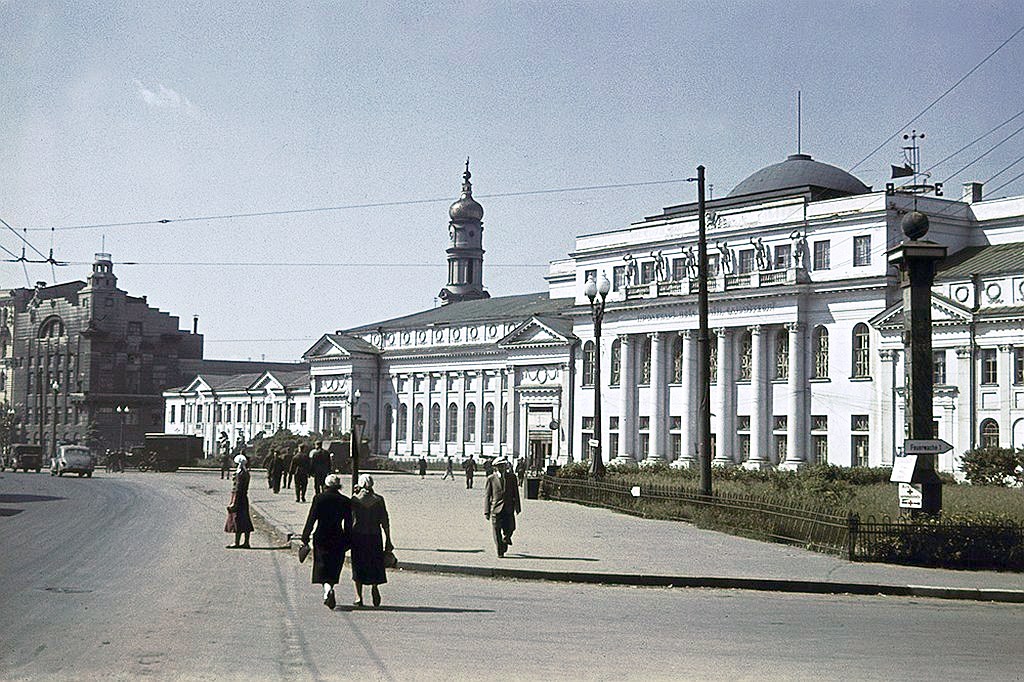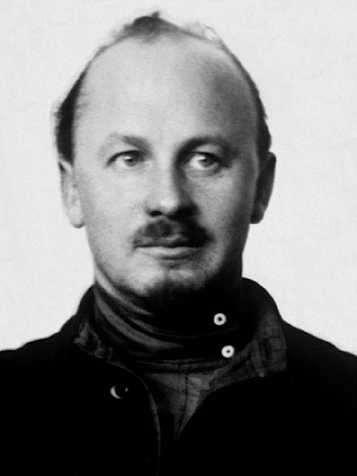|
Dmitry Manuilsky
Dmitriy Manuilsky, or Dmytro Zakharovych Manuilsky ( Russian: Дми́трий Заха́рович Мануи́льский; Ukrainian: Дмитро Захарович Мануїльський; October 1883 in Sviatets near Kremenets – 22 February 1959 in Kiev) was an important Bolshevik revolutionary, Soviet politician and academic who was Secretary of the Executive Committee of Comintern, the Communist International, from December 1926 to its dissolution in May 1943. Life Background Manuilsky was born to a peasant family of an Orthodox priest in Kremenets. After secondary school, he enrolled at the University of St. Petersburg in 1903, and joined the Bolshevik faction of the Russian Social Democratic Labour Party in 1904. During the 1905 revolution he was assigned by the Bolsheviks to the naval base in Kronstadt where he took part in the naval revolt in July. Arrested, he was held in Kronstadt prison in 1905-06, then exiled, but escaped, arriving in Kiev and then, in ... [...More Info...] [...Related Items...] OR: [Wikipedia] [Google] [Baidu] |
Communist Party Of Ukraine (Soviet Union)
The Communist Party of Ukraine ( uk, Комуністична Партія України ''Komunistychna Partiya Ukrayiny'', КПУ, ''KPU''; russian: Коммунистическая партия Украины) was the founding and ruling political party of the Ukrainian Soviet Socialist Republic operated as a republican branch ( union republics) of the Communist Party of the Soviet Union (CPSU).Pyrih, R. Communist Party of Ukraine, the Soviet period (КОМУНІСТИЧНА ПАРТІЯ УКРАЇНИ РАДЯНСЬКОЇ ДОБИ)'. Encyclopedia of History of Ukraine. 2007 No decision of the government of Ukraine (Council of Ministers) was adopted without approval of the Central Committee of the Communist Party of Ukraine. The Communist Party of Ukraine is not one and the same party as the Ukrainian Communist Party or Ukrainian Communist Party (Borotbists). Founded as the Communist Party (Bolsheviks) of Ukraine (CP(b)U) in 1918 in Moscow, Russian SFSR, it was the so ... [...More Info...] [...Related Items...] OR: [Wikipedia] [Google] [Baidu] |
Central Committee Elected By The 11th Congress Of The Russian Communist Party (Bolsheviks)
The Central Committee (CC) composition was elected by the 11th Congress, and sat from 2 April 1922 until 25 April 1923 . The CC 1st Plenary Session renewed the composition of the Politburo, Secretariat and the Organizational Bureau (OB) of the Russian Communist Party (Bolsheviks). Plenums The CC was not a permanent institution. It convened nine plenary sessions between the 11th Congress and the 12th Congress. When the CC was not in session, decision-making powers were transferred to inner bodies of the CC itself; the Politburo A politburo () or political bureau is the executive committee for communist parties. It is present in most former and existing communist states. Names The term "politburo" in English comes from the Russian ''Politbyuro'' (), itself a contractio ..., Secretariat and Orgburo (none of these bodies were permanent either, but convened several times a months). Apparatus Individuals employed by Central Committee's bureaus, departments and newspapers m ... [...More Info...] [...Related Items...] OR: [Wikipedia] [Google] [Baidu] |
1905 Russian Revolution
The Russian Revolution of 1905,. also known as the First Russian Revolution,. occurred on 22 January 1905, and was a wave of mass political and social unrest that spread through vast areas of the Russian Empire. The mass unrest was directed against the Tsar, nobility, and ruling class. It included worker strikes, peasant unrest, and military mutinies. In response to the public pressure, Tsar Nicholas II enacted some constitutional reform (namely the October Manifesto). This took the form of establishing the State Duma, the multi-party system, and the Russian Constitution of 1906. Despite popular participation in the Duma, the parliament was unable to issue laws of its own, and frequently came into conflict with Nicholas. Its power was limited and Nicholas continued to hold the ruling authority. Furthermore, he could dissolve the Duma, which he often did. The 1905 revolution was primarily spurred by the international humiliation as a result of the Russian defeat in the Russo-J ... [...More Info...] [...Related Items...] OR: [Wikipedia] [Google] [Baidu] |
Russian Social Democratic Labour Party
The Russian Social Democratic Labour Party (RSDLP; in , ''Rossiyskaya sotsial-demokraticheskaya rabochaya partiya (RSDRP)''), also known as the Russian Social Democratic Workers' Party or the Russian Social Democratic Party, was a socialist political party founded in 1898 in Minsk (then in Northwestern Krai of the Russian Empire, present-day Belarus). Formed to unite the various revolutionary organizations of the Russian Empire into one party, the RSDLP split in 1903 into Bolsheviks ("majority") and Mensheviks ("minority") factions, with the Bolshevik faction eventually becoming the Communist Party of the Soviet Union. History Origins and early activities The RSDLP was not the first Russian Marxist group; the Emancipation of Labour group had been formed in 1883. The RSDLP was created to oppose the revolutionary populism of the Narodniks, which was later represented by the Socialist Revolutionary Party (SRs). The RSLDP was formed at an underground conference in Mins ... [...More Info...] [...Related Items...] OR: [Wikipedia] [Google] [Baidu] |
Priesthood (Eastern Orthodox Church)
Presbyter is, in the Bible, a synonym for ''bishop'' (''episkopos''), referring to a leader in local church congregations. In modern Eastern Orthodox usage, it is distinct from ''bishop'' and synonymous with priest. Its literal meaning in Greek (''presbyteros'') is "elder". Holy orders Through the sacrament of holy orders, an ordination to priesthood is performed by the bishop. But this requires the consent of the whole people of God, so at a point in the service, the congregation acclaim the ordination by shouting "Axios!" ("He is worthy!"). Orthodox priests consist of both married clergy and celibate clergy. In the Orthodox Church a married man may be ordained to the priesthood. His marriage, however, must be the first for both him and his wife. He may not remarry and continue in his ministry even if his wife should die. If a single, or unmarried, or celibate, man is ordained, he must remain celibate to retain his service. A celibate priest is not necessarily the same as tha ... [...More Info...] [...Related Items...] OR: [Wikipedia] [Google] [Baidu] |
Comintern
The Communist International (Comintern), also known as the Third International, was a Soviet Union, Soviet-controlled international organization founded in 1919 that advocated world communism. The Comintern resolved at its Second Congress to "struggle by all available means, including armed force, for the overthrow of the international bourgeoisie and the creation of an international Soviet republic (system of government), Soviet republic as a transition stage to the complete abolition of the state". The Comintern was preceded by the 1916 dissolution of the Second International. The Comintern held seven World Congresses in Moscow between 1919 and 1935. During that period, it also conducted thirteen Enlarged Plenums of its governing Executive Committee of the Communist International, Executive Committee, which had much the same function as the somewhat larger and more grandiose Congresses. Joseph Stalin, leader of the Soviet Union, dissolved the Comintern in 1943 to avoid antag ... [...More Info...] [...Related Items...] OR: [Wikipedia] [Google] [Baidu] |
Bolshevik
The Bolsheviks (russian: Большевики́, from большинство́ ''bol'shinstvó'', 'majority'),; derived from ''bol'shinstvó'' (большинство́), "majority", literally meaning "one of the majority". also known in English as the Bolshevists,. It signifies both Bolsheviks and adherents of Bolshevik policies. were a far-left, revolutionary Marxist faction founded by Vladimir Lenin that split with the Mensheviks from the Marxist Russian Social Democratic Labour Party (RSDLP), a revolutionary socialist political party formed in 1898, at its Second Party Congress in 1903. After forming their own party in 1912, the Bolsheviks took power during the October Revolution in the Russian Republic in November 1917, overthrowing the Provisional Government of Alexander Kerensky, and became the only ruling party in the subsequent Soviet Russia and later the Soviet Union. They considered themselves the leaders of the revolutionary proletariat of Russia. Their bel ... [...More Info...] [...Related Items...] OR: [Wikipedia] [Google] [Baidu] |
Kremenets
Kremenets ( uk, Крем'янець, Кременець, translit. ''Kremianets'', ''Kremenets''; pl, Krzemieniec; yi, קרעמעניץ, Kremenits) is a city in Ternopil Oblast (province) of western Ukraine. It is the administrative center of the Kremenets Raion (district), and lies 18 km north-east of the great Pochayiv Monastery. The city is situated in the historic region of Volhynia. It hosts the administration of Kremenets urban hromada, one of the hromadas of Ukraine. Population: History According to some sources the Kremenets fortress was built in the 8th or 9th century, and later became a part of Kievan Rus'. The first documented reference to the fortress is given in a Polish encyclopedic dictionary written in 1064. The first reference to Kremenets in Old Slavic literature dates from 1226 when the city's ruler, Mstislav the Bold, defeated the Hungarian army of King Andrew II nearby. During the Mongol invasion of Rus in 1240–1241, Kremenets was one of f ... [...More Info...] [...Related Items...] OR: [Wikipedia] [Google] [Baidu] |
Ukrainian Language
Ukrainian ( uk, украї́нська мо́ва, translit=ukrainska mova, label=native name, ) is an East Slavic language of the Indo-European language family. It is the native language of about 40 million people and the official state language of Ukraine in Eastern Europe. Written Ukrainian uses the Ukrainian alphabet, a variant of the Cyrillic script. The standard Ukrainian language is regulated by the National Academy of Sciences of Ukraine (NANU; particularly by its Institute for the Ukrainian Language), the Ukrainian language-information fund, and Potebnia Institute of Linguistics. Comparisons are often drawn to Russian, a prominent Slavic language, but there is more mutual intelligibility with Belarusian,Alexander M. Schenker. 1993. "Proto-Slavonic," ''The Slavonic Languages''. (Routledge). pp. 60–121. p. 60: " hedistinction between dialect and language being blurred, there can be no unanimity on this issue in all instances..."C.F. Voegelin and F.M. Voegelin ... [...More Info...] [...Related Items...] OR: [Wikipedia] [Google] [Baidu] |
Russian Language
Russian (russian: русский язык, russkij jazyk, link=no, ) is an East Slavic language mainly spoken in Russia. It is the native language of the Russians, and belongs to the Indo-European language family. It is one of four living East Slavic languages, and is also a part of the larger Balto-Slavic languages. Besides Russia itself, Russian is an official language in Belarus, Kazakhstan, and Kyrgyzstan, and is used widely as a lingua franca throughout Ukraine, the Caucasus, Central Asia, and to some extent in the Baltic states. It was the ''de facto'' language of the former Soviet Union, Constitution and Fundamental Law of the Union of Soviet Socialist Republics, 1977: Section II, Chapter 6, Article 36 and continues to be used in public life with varying proficiency in all of the post-Soviet states. Russian has over 258 million total speakers worldwide. It is the most spoken Slavic language, and the most spoken native language in Europe, as well as the ... [...More Info...] [...Related Items...] OR: [Wikipedia] [Google] [Baidu] |
Baykove Cemetery
Baikove Cemetery ( uk, Байкове кладовище) is a historic cemetery memorial in Holosiiv Raion of Kyiv, Ukraine. It is a National Historic Landmark of Ukraine and is known as a necropolis of distinguished people. It was established in 1833. Among the buried, it includes Leonid Kravchuk, Mykhailo Hrushevskyi, Lesya Ukrainka, Slava Stetsko, Viacheslav Chornovil, Oles Honchar, Ivan Nechuy-Levytsky, Danylo Lyder,Olena Pchilka, Mykhailo Starytsky, Oleksandr Bilash, Ostap Vyshnya, Ivan Mykolaychuk, Volodymyr Shcherbytsky, Leonid Telyatnikov, Mikhail Vaschenko-Zakharchenko, Oleg Antonov, Viktor Bannikov and Valeri Lobanovsky and the soldier that raised the soviet flag over Berlin: Aleksey Kovalev. History The cemetery was established in 1833. It has got its name from the nearby Baikovo estate. The oldest part of the cemetery is located south of the present vul. Baikova. The biggest part is located north of the street and was established in the 1880s. It is partl ... [...More Info...] [...Related Items...] OR: [Wikipedia] [Google] [Baidu] |







